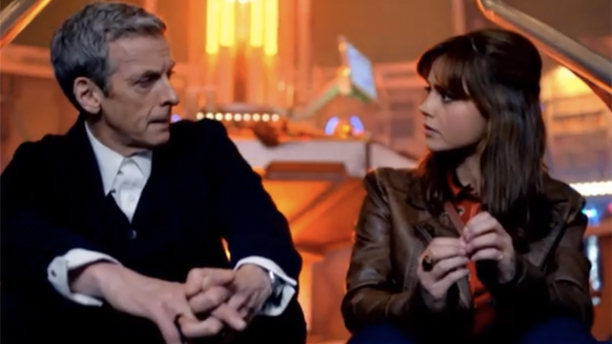Doctor Who is a show of change. For most shows, the series centers on the same characters year in and year out, occasionally changing in a new cast member for an old one as an actor decides not to renew their contract, is killed off, or let go for one reason or another. On a good show, those changes are typically done subtly, the writers working to integrate the new characters seamlessly with the old. Doctor Who does the opposite. It highlights its cast changes. The show is all about change and that is what makes it so unique and exciting. At least twelve men have played the Doctor?not as an interchangeable entity, but rather as unique personalities that also make up a single whole.
This season’s premiere features Peter Capaldi as the newest Doctor, and what a change we see. Perhaps this regeneration was particularly rough, perhaps it was the way in which he regenerated, but whatever the cause, the difference was bigger than in past seasons. And I don’t just mean in terms of age. Sure, Capaldi is a lot older than former Doctor Who star Matt Smith, but it was the personality, more than anything else, that was noticeably different.
Capaldi’s version of the Doctor was grumpier, moodier, and less predictable than his predecessors (at least so far as the 2005 reboot is concerned). The version of the Doctor who loved Rose Tyler told her that his clone needed her because “[he was] born in battle. Full of blood and anger and revenge. Remind you of someone? That’s me, when we first met. And you made me better. Now you can do the same for him.” In some ways, Capaldi is very similar, having fought for his life in the midst of his transformation. The difference is that the Doctor would never intentionally abandon Rose in her moments of terror and fear. He would never leave her without at least saying “I have an idea” or “I know what to do” or some sort of assurance that he would be there for her. Capaldi’s Doctor all but abandons Clara on more than one occasion in this season premiere. Sure, he comes back, but if not for her own cleverness, she would not have survived to see his return and she would not have known that he was planning to come back at all. The fact that she was regularly unsure if he would be there for her or leave her stranded is indicative of the shift in his personality.
Part of Clara’s confusion, concern, and uncertainty comes from the fact that she has never lived through a regeneration and she had a hard time reconciling the Doctor she knew and was most assuredly crushing on with this older guy who barely remembered that he knew her. Of the companions in the 2005+ era Doctor Who, only Rose has actually lived through this experience of changing Doctors and she too found the change disquieting, despite a significantly less pronounced personality shift. Past regenerations left the Doctor exploring his new taste buds and body, but with his memory intact. This time, however, the Doctor was confused. He couldn’t quite remember anything, though he seemed to know he was still himself. I don’t know how I feel about Capaldi and I am willing to see where this new incarnation takes us before I judge, but I am certainly intrigued.
It is not only the titular character that changes. Clara too seemed to change. Not so much in actual personality, but in how she related to the audience. Where before she was mostly a plot device?the “Impossible Girl”?now she was our surrogate, mirroring on screen how many people feel about Capaldi?hesitant, unsure, skeptical. Capaldi has some pretty big shoes to fill after all. Matt Smith played the Doctor longer than anyone else since 2005 and he was well-loved. Many viewers came to the show in his era, and, like Clara, have never experienced a regeneration. To me, Clara felt more useful and involved in this episode than ever before. She was strong and determined, but also vulnerable and relatable.
In fact, I found Madame Vastra, who I normally quite like, to be patronizing, judgmental, and inconsiderate. She immediately assumed that Clara’s hesitation and confusion with the Doctor was purely about his looks and not a larger disorientation. The guy she was interested in was, in many ways, gone. Sure, parts of the Doctor are still there in this new incarnation, but only parts. Even a call from the old Doctor (a welcome appearance by Smith), urging Clara to accept the new Doctor and help him, never addressed how she might actually be feeling about the entire situation. What would have been nice is if Rose Tyler could have been brought in for the transition, to talk to her about how she understands these feelings of loss and uncertainty and how the Doctor Clara has come to care about is still in there, however different he has become. Wishful thinking, I know, but I would have liked to see some compassion and understanding, not just rebuke and admonition.
I hope we see Clara continue to grow (though there are rumors or her departure being near at hand) and I look forward to seeing where we go with Capaldi’s Doctor. The continual change of the series is what makes the show stay fresh and exciting. This is why Doctor Who could celebrate 50 years recently. Capaldi’s older Doctor allows for a darker, less whimsical tone, but does not forgo the comedy altogether.

